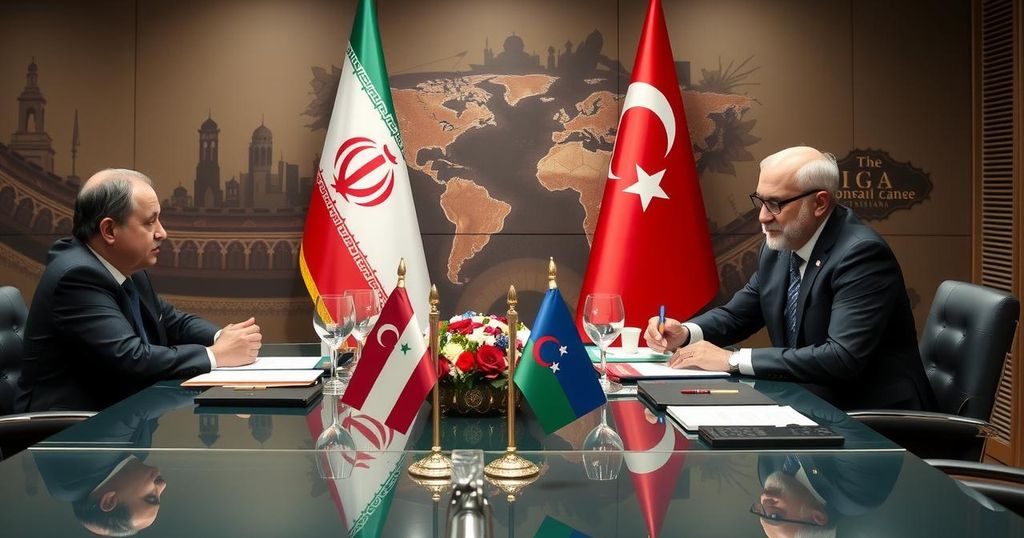Iran’s Foreign Minister met with Turkish and Egyptian officials to enhance economic ties at the D-8 event in Cairo, demonstrating Iran’s strategy to engage with non-Western countries. The discussions included remarks from Pakistan’s Foreign Minister expressing solidarity with Palestine, indicating a growing collaboration among these nations.
Iran seeks to strengthen its economic collaborations through recent diplomatic engagements with Turkey and Egypt. Iranian Foreign Minister Abbas Araghchi convened in Cairo with his Turkish counterpart, Hakan Fidan, and Egypt’s Badr Abdel Aaty during the D-8 Organization of Economic Cooperation meeting. This assembly highlights Iran’s efforts to connect with countries that have varying political alignments, particularly those with Western affiliations. Notably, Israel’s exclusion from such discussions illustrates the geopolitical complexities of the region.
The D-8 comprises key partners including Iran, Egypt, Turkey, Pakistan, Indonesia, Nigeria, Malaysia, and Bangladesh, indicating a significant coalition focused on economic cooperation. This assembly follows Iran’s recent initiatives to join other economic frameworks such as BRICS and the Shanghai Cooperation Organization (SCO), aiming to enhance relations primarily with nations outside of Western influence.
Iranian President Masoud Pezeshkian’s arrival in Cairo further exemplifies the importance placed upon this initiative. Additionally, the engagement between Foreign Minister Araghchi and Pakistan’s Foreign Minister Mohammad Ishaq Dar underscores a commitment to fostering stronger ties among these nations. Reports detail a mutual acknowledgment of the expanding political and economic exchanges between Iran and Pakistan. Dar further emphasized solidarity, stating that his government supports the oppressed Palestinian people, reaffirming Pakistan’s position in regional politics.
The series of meetings indicates a decisive move by Iran to nurture its international relations by collaborating with non-Western allies. As Iran aligns itself with these countries, it highlights the ongoing evolution of economic partnerships in the region, a strategic pivot aimed at circumventing traditional Western-led platforms.
The D-8 Organization, established in 1997, seeks to foster economic cooperation among its member nations, characterized by a shared objective of enhancing trade and development. The organization includes nations that are emerging markets and aims to promote self-sustaining growth through collective efforts. In light of increasing global geopolitical tensions and shifting alliances, Iran’s active engagement with such countries reflects its strategic desire to partner with non-Western states, particularly amidst economic sanctions and international isolation following its nuclear policy negotiations. The recent meetings signal Iran’s commitment to bolstering economic ties with other member states, reflecting an intention to diversify its economic alliances beyond Western influences.
In summary, Iran’s diplomatic outreach through meetings with Turkey and Egypt within the D-8 framework illustrates its strategic intent to solidify economic relations with non-Western countries. This initiative represents a broader effort to navigate geopolitical challenges and enhance bilateral partnerships, as evidenced by further discussions with Pakistan. Such collaborations underscore Iran’s role in a shifting economic landscape, highlighting a concerted approach to formulating alliances that transcend traditional geopolitical boundaries.
Original Source: www.jpost.com






